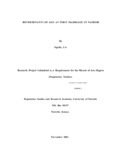| dc.description.abstract | This study investigated the relationship of parental characteristics to the marital transitions of
children. It explicitly distinguished various dimensions of parental characteristics of religion,
ethnicity, and education and also established ethnic and generational differences in first
marriage. To achieve this objective, the study used primary data collected by the Nairobi
Integration Project. The survey was done in Nairobi for which a multistage sampling procedure
was used to select 150 respective enumeration areas.
Event History was used as the main method of analysis. This mainly involved use of Cox
proportional hazards model and survival tables. The survival tables were used to obtain the
proportions and the median ages at first marriage by generations and ethnicity. The results
found that the proportions married across the cohorts by age 31.6 years was highest for the
oldest cohort (45-54) and highest for the western and coastal Bantus among the ethnic groups.
Hence the prevalence of first marriage was highest for these particular groups. The median age
at first marriage was lowest for the oldest age group (23.0) and for the western and coastal
Bantus (21.0). The overall median age at first marriage was 23.0 years. The study also found
that there are no significant differences in first marriage between generations and no significant
differences between ethnic groups.
The multivariate regression results found that parental characteristics are insignificant in
determining entry into marriage. This was inconsistent with the predicted hypothesis that
parental characteristics have an influence in first marriage. However, individual characteristics
had a significantly negative effect on entry into first marriage.
viii
The study therefore concluded that entry into first marriage is not determined by parental
characteristics but it is a matter of individual independent decision. There are no generational
differences in marriage timing across the cohorts and no differences across ethnic groups.
Therefore age at first marriage has not changed and marriage remains an early and universal
social institution. | |

